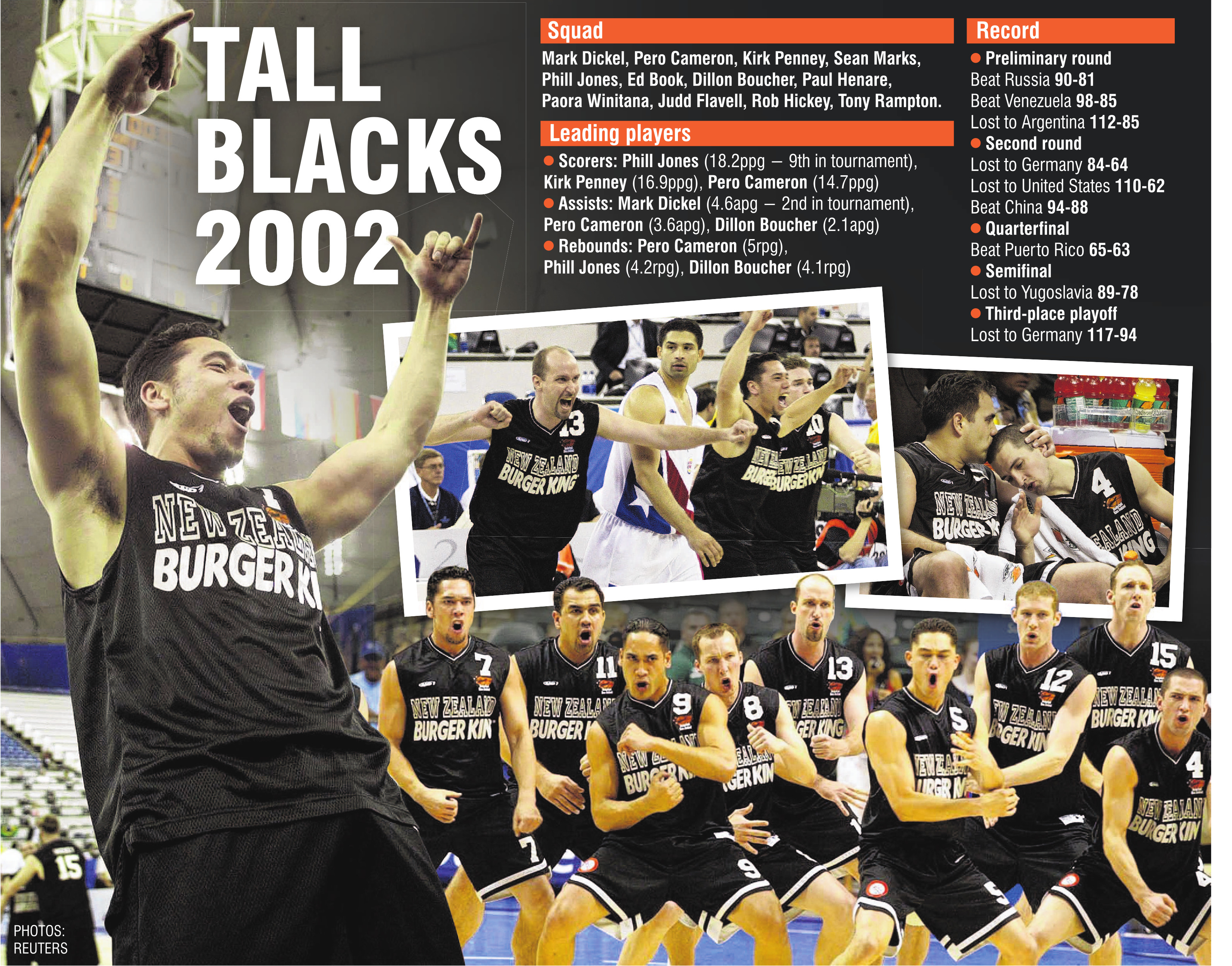
Disappoinment swept over the Tall Blacks.
Kiwi pride reigned strongly at home, but the men in black were gutted as they left the court at Conseco Fieldhouse in Indianapolis.
They had led Yugoslavia 48-39 at halftime of their world championships semifinal in 2002.
But a team loaded with still-recognisable NBA names — Peja Stojakovic and Vlade Divac among them — took over to win 89-78.
It had been a great run.
No-one had expected much from the Tall Blacks, least of all the wider New Zealand public.
As the wins started coming, the world took notice.
The team, though, had arrived — and there was no doubt in the players’ minds they were capable of great things.
"What sticks out most is, as much as we came fourth in the world and it was amazing, we were properly gutted," 2002 Tall Blacks guard, and now Basketball New Zealand chief executive Dillon Boucher said.
"We should have won our game to go in to medal. We were playing Yugoslavia and we were up at halftime.
"We just didn’t play well in the second half and they came back to beat us right at the end of that game.
"That was one that got away. We would’ve been playing for a gold medal at the end of that game.
"So in that sense, there was a lot of disappointment from the team. It wasn’t until afterwards that we realised the impact we’d had back home and how big it was."
The Tall Blacks had been to just one world championships before Indianapolis.
At that tournament, in 1986, they were roundly thrashed, except for a two-point win over Malaysia.
Yet 2002 was the dawn of a new generation, one that gave birth to many of the greats of the game in this country.
Dunedin star Mark Dickel ran the point for a team that included the likes of Pero Cameron, Phill Jones, Kirk Penney and Sean Marks, who was injured halfway through.
Beating Australia to reach the tournament, for the only time since the inaugural win in 1978, had been an achievement in itself.
Just being in Indiana seemed like a win.
But an extensive European build-up tour had yielded wins over Yugoslavia and Germany, making one thing clear to this team — it could foot it with the world’s best.
That, and the influence of head coach Tab Baldwin, as well as assistant coach Nenad Vucinic, had been integral to the squad’s mentality.
"I guess, obviously, the win against Australia was amazing — that got us on the journey," 2002 shooting guard Phill Jones said.
"A lot of credit has to go back to Tab and Nenad, who were the coaching staff at this stage. They started to instil this belief in us that we were there to win games and we could compete at the highest level.
"Everything we did in the build-up was aimed at Russia, our first game. We didn’t think about any games past that first game.
"We just wanted to go into that tournament and be ready to play that Russia team and beat them. Which we did. We kind of shocked everyone.
"Those two guys had us prepared for that game, instilling this belief in us that we were ready and we’d arrived."
That 90-81 win over Russia, ranked fifth in the world, alongside a win over Venezuela, helped the Tall Blacks through to the second round.
They were beaten by Germany and stuck with the United States until halftime, before an NBA-laden team ran over them in the second half.
Jones went off for 33 points, though, in the crucial 94-88 win over China — pegging back a 35-13 first-quarter deficit to reach the quarterfinals.
In that quarterfinal, the Tall Blacks were locked 63-63 with Puerto Rico when Boucher drove to the hoop with 23 seconds left.
He dumped off to Cameron, the now-Tall Blacks head coach finishing at the hoop to put the team ahead by two and clinch a spot in the semifinal.
That semifinal did not go the way the Kiwis wanted, while the third-placed playoff against Germany ended in a 117-94 loss.
But the Tall Blacks had made their mark, and the players slowly realised what they had done.
"As we progressed through the tournament, we won a few games," Jones said.
"We won the right games at the right time to get us through to the next stages.
"The support ... we were hearing about what was happening back in New Zealand. There was this real buzz around the national team.
"Schools were stopping, work was stopping, everyone was turning on TVs to watch the games. That was really cool.
"We got a huge amount of support from people back home via social media, which was very limited back then, emails and different things."
Jones finished the tournament as its ninth-leading scorer, averaging 18.2 points per game.
Cameron was named to the All Star Five — alongside a quartet of greats in Stojakovic, Dirk Nowitzki, Manu Ginobili and Yao Ming — and in 2017 was inducted to the Fiba Hall of Fame.
The Tall Blacks never reached the heights of 2002 in terms of placings again.
They ran into an Argentina team, amid what is widely considered the country’s "golden generation", in the 2006 round of 16.
Their performance at the 2004 Athens Olympics was perhaps the true height of this team, though.
New Zealand won just one game — and did not progress out of its pool, a much harder task at the Olympics with fewer teams present.
However, it came within four points of Argentina and Spain — led by Ginobili and Pau Gasol respectively — while being edged by Italy by two.
Argentina and Italy went on to play in the gold-medal match, the former knocking out a United States team including Tim Duncan and a young LeBron James.
"We played really, really well," Jones said.
"I think we lost those games in the last 30 seconds of the game. A couple of bounces of the ball, a couple of calls go our way, it could have been a different story.
"I feel like we played much better in that tournament, because teams knew who we were and they were ready for us. But we still managed to compete at a very high level, we just didn’t get the wins.
"I felt like our brand of basketball and the way we played, it was very good. It was another step up from the 2002 world champs."
— NEXT WEEK: Where the 2002 heroes ended up; the boom of basketball in New Zealand; how the women’s game developed; what the future holds.











